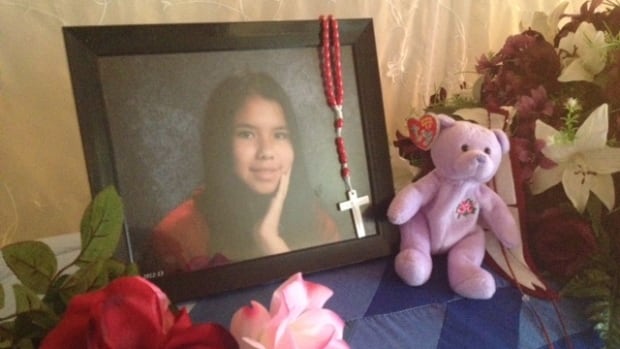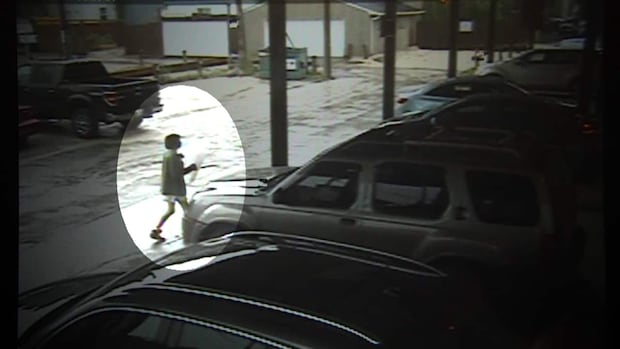Though no one has been found guilty for the murder of Tina Fontaine 10 years ago, the investigator who led the search for the teen’s killer maintains that the police charged the right person.
Fontaine, 15, had been missing for eight days when her lifeless, 72-pound body — weighed down by rocks and wrapped in a duvet cover — was pulled from Winnipeg’s Red River near the Alexander Docks on Aug. 17, 2014.
“It took hours and hours before we could even start to think that this was Tina Fontaine,” said John O’Donovan, a retired Winnipeg police sergeant who led the investigation into Fontaine’s killing.
“And once we did, you know, it was sickening.”
Fontaine, who was from Sagkeeng First Nation in Manitoba, was in the care of Child and Family Services when she died. After her father’s murder in 2011, she went to Winnipeg to reconnect with her mother, but fell into a world of addiction, homelessness and sexual exploitation.
She was reported missing four times in the three weeks before she disappeared on Aug. 8, 2014. The night before that, she was dropped off with a contracted care worker at a downtown hotel, but she later walked away.
“She was an exploited kid, there’s no doubt about it. She was exploited by everybody that came in contact with her,” said O’Donovan.
“There was only a [handful] of people that cared for her…. and some of the people that should have cared for her, didn’t.”
Fontaine’s death shook the city, attracting global attention as police began to search for her killer. It also helped galvanize the federal government into launching the National Inquiry into Missing and Murdered Indigenous Women and Girls, which released its final report in 2019.
“It was such a tragedy,” O’Donovan said.
He says it was important to remind people that Fontaine was just a young girl, and O’Donovan went off-script as he spoke publicly the day after her body was discovered.
“This is a child that’s been murdered,” he said at a news conference on Aug. 18, 2014.
“We would be horrified if we found a litter of kittens or pups in this condition. This is a child.”
It was a moment that had never been seen before in Canada, humanizing cases of missing and murdered Indigenous women and girls, said Manitoba Families Minister Nahanni Fontaine.
“That was actually one of the first times that you saw somebody really show compassion and caring, and almost challenge the public on how you see this little girl,” she told reporters at a news conference last week.
White skirt remark a ‘dynamite’ clue
At the same time, the investigation into Fontaine’s death was just beginning. O’Donovan says it was “intense” and police were under a lot of self-imposed pressure to keep the case from going cold.
The investigation involved an expensive, six-month undercover sting operation by Winnipeg police that consisted of secret recordings of Raymond Cormier, who was identified as a suspect in Fontaine’s death early on in the investigation.
The operation, dubbed Project Styx, was “like directing a movie, but the stakes are so much higher,” O’Donovan said.
Cormier was subsequently arrested and charged with second-degree murder in December 2015.
While he didn’t get the full-blown confession that he wanted from Cormier, O’Donovan says the evidence police did get convinced him that they had the right man, as Cormier shared information about Fontaine that had never been publicly released.
Cormier told a friend that he thought he’d seen a ghost walking down the street, according to O’Donovan.
“He saw a girl who he believed was Tina Fontaine, and she looked like her, she was built like her, she was young,” O’Donovan said.
“Then the one thing that he said — which I found was dynamite — [was that] she was even wearing the same white skirt,” he said.
“Now in all the pictures we put out of Tina, she never wore a white skirt. Unfortunately, the body we took from the river, she was wearing a white skirt.”
Security camera footage from the day Fontaine went missing was shown during Cormier’s trial. The footage appears to show her wearing a white skirt.
WATCH | Tina Fontaine security camera footage:
Security camera footage shows Tina Fontaine walking into the parking lot behind the Helen Betty Osborne Centre on Ellice Avenue on Aug. 8, 2014.
A jury acquitted Cormier of the second-degree murder charge in February 2018. Crown prosecutors decided not to appeal the jury’s decision, and no one else has been charged in Tina’s death.
O’Donovan said evidence and witness testimony included in Cormier’s trial were poor quality.
“Do I think we arrested and charged the wrong person? I don’t believe so,” he said.
“The justice system works, and it didn’t like the evidence that we were able to put forward, and that’s what happens.”
Cormier died in Ottawa on April 2, the city’s police service said.
Fontaine’s aunt, Thelma Favel, said at the time that she’s still convinced Cormier was guilty and that two years ago, she received a letter from a relative of Cormier who claimed he had confessed to killing the teen.

O’Donovan says police investigated 17 other homicides between the discovery of Fontaine’s body and Cormier’s arrest. Over those 15 months, he told Fontaine’s family that police were working on her case every day, and they were, but he says it varied from five minutes to five hours.
“I always strung them along basically, and I’m really sorry for having to do that, but it was something that I had to do,” he said.
“I feel bad about that, but it’s something that we had to do … to try and get a successful conclusion. To me, getting it into court was a big deal.”
While O’Donovan investigated many homicides during his time as a police officer, he says he can’t allow himself to think about the victims too much anymore.
“Unfortunately, I knew them when they were dead, and that’s how I think of them now,” he said.
“If you were to dwell on that, I think it could probably drive you crazy.”
A decade after 15-year-old Tina Fontaine’s body was pulled from the Red River in Winnipeg, CBC’s Brittany Greenslade sits down with Sgt. John O’Donovan, the now-retired police officer who led the investigation into her death.




